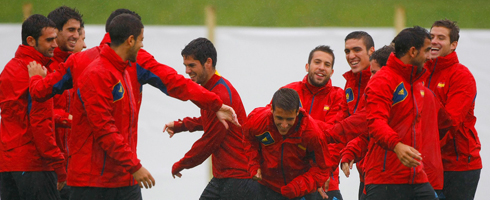In the aftermath of Spain securing their third consecutive major international tournament in Kiev last month, two major themes dominated the analysis.
The first simply surrounded how the one-time perennial tournament bottlers became so good and so consistent, the second, with the average age of the squad under 27, surrounded how long could their dominance last.
For two of the more experienced members of the squad the secret to success comes in how long they have cohabited in Spanish teams at all levels.
Iker Casillas and Xavi Hernandez won the World Youth Championships together when they were 18 and 19 respectively and whilst it took them until their late 20s to tournament success at senior level, they are now amongst the most decorated players in world football.
However, they and Xabi Alonso were the only players used at the Euros over 30, the likes of Jordi Alba, Sergio Ramos, Gerard Pique, Sergio Busquets, Andres Iniesta, David Silva and Cesc Fabregas still have plenty of tournaments in front of them. What might prevent them from future squads isn't the wear and tear of age, but the next generation of highly talented and already successful youngsters breaking through.
Of the 18-man squad selected for the Olympics three – Alba, Javi Marquez and Juan Mata – lifted the Euros last month. The latter two and 11 others won the European Under-21 Championships last year, a number that would have been even higher but for Mikel San Jose and Thiago Alcantara having to withdraw due to illness and injury respectively.
Of those not involved in Denmark last year, Oriol Romeu, Koke, Isco, Cristian Tello, Alvaro Vasquez and Rodrigo were at the FIFA U-20 World Cup in Colombia instead, leaving Inigo Martinez as the only member of the Olympic squad without tournament experience in the past 12 months.
Much has been made of the continuity that has allowed the current group to grow together and win together. There were only four changes in the 23-man squad from the World Cup in 2010 to that which travelled to Poland and Ukraine, two of which were enforced by injuries to Carles Puyol and David Villa.
Seven have played in all three finals, a further six in two of them and yet there has already been signs of a generational shift. There were 10 changes this summer from the squad that won the Euros to that which won it four years ago. Alba now appears set to be the long-term successor to Joan Capdevila, Busquets has assumed Marcos Senna's role, Ramos and Pique's partnership shows there is less to fear when Puyol retires, whilst Pedro and Jesus Navas offered pace and width at vital times.
And therein lies the challenge to those headed to the Olympics, places will be available and rewarded on merit, you just have to prove you deserve to be selected ahead of the proven champions.
“I tell you something,” Casillas said after the 4-0 demolition of Italy. “In a couple of years there will be new players and, although it is true that we have a great Under-21s, you have to unite that group and make it work."
Now it is the younger generation's chance to prove they are not just great, but winners.

